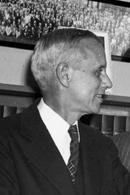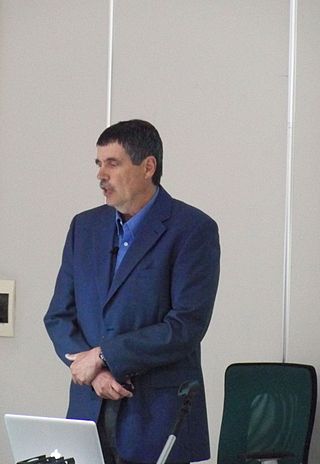Related Research Articles

George Ledyard Stebbins Jr. was an American botanist and geneticist who is widely regarded as one of the leading evolutionary biologists of the 20th century. Stebbins received his Ph.D. in botany from Harvard University in 1931. He went on to the University of California, Berkeley, where his work with E. B. Babcock on the genetic evolution of plant species, and his association with a group of evolutionary biologists known as the Bay Area Biosystematists, led him to develop a comprehensive synthesis of plant evolution incorporating genetics.

Edmund Ware Sinnott was an American botanist and educator. Sinnott is best known for his work in plant morphology.
Simon Asher Levin is an American ecologist and the James S. McDonnell Distinguished University Professor in Ecology and Evolutionary Biology and the director of the Center for BioComplexity at Princeton University. He specializes in using mathematical modeling and empirical studies in the understanding of macroscopic patterns of ecosystems and biological diversities.

Paul Alan Cox is an American ethnobotanist whose scientific research focuses on discovering new medicines by studying patterns of wellness and illness among indigenous peoples. Cox was born in Salt Lake City in 1953.

Naomi E. Pierce is an American entomologist and evolutionary biologist who studies plant-herbivore coevolution and is a world authority on butterflies. She is the Hessel Professor of Biology and Curator of Lepidoptera in the Department of Organismic and Evolutionary Biology at Harvard University.
Steven Neil Handel is an American educator and restoration ecologist. Handel is currently Distinguished Professor of Ecology at Rutgers University and Visiting Professor at the Harvard University Graduate School of Design.

John Charles Avise is an American evolutionary geneticist, conservationist, ecologist and natural historian. He is a Distinguished Professor of Ecology & Evolution, University of California, Irvine, and was previously a Distinguished Professor of Genetics at the University of Georgia.
Karl Joseph Niklas is the Liberty Hyde Bailey Professor emeritus in the Section of Plant Biology, School of Integrative Plant Science, at Cornell University. He is best known for his work on plant biomechanics, allometry, and functional morphology, and for his long-standing contributions to understanding plant evolutionary biology, particularly early land plant evolutionary diversification patterns and morphospaces.

Stephen C. Stearns is an American biologist, and the Edward P. Bass Professor of Ecology and Evolutionary Biology Emeritus at Yale University. He is known for his work in life history theory and evolutionary medicine.

Kamaljit Singh Bawa, FRS is an evolutionary ecologist, conservation biologist and a distinguished professor of Biology at the University of Massachusetts, Boston. He is also the founder of Ashoka Trust for Research in Ecology and Environment (ATREE). In 2012, Bawa received the first Gunnerus Sustainability Award, the world's major international award for work on sustainability. He is an elected member of the American Academy of Arts and Sciences. He was elected a Member of the American Philosophical Society in 2019.
Aaron M. Ellison is an American ecologist, photographer, sculptor, and writer. He retired in July 2021 after 20 years as the senior research fellow in ecology at Harvard University and as a Senior Ecologist at the Harvard Forest. He also served as deputy director of the Harvard Forest from 2018 to 2021. Until 2018, he also was an adjunct research professor at the University of Massachusetts in the Departments of Biology and Environmental Conservation. Ellison has both authored and co-authored numerous scientific papers, books, book reviews and software reviews. For more than 30 years, Ellison has studied food-web dynamics and community ecology of wetlands and forests; the evolutionary ecology of carnivorous plants; the responses of plants and ants to global climate change; application of Bayesian statistical inference to ecological research and environmental decision-making; and the critical reaction of Ecology to Modernism. In 2012 he was elected a fellow of the Ecological Society of America. He was the editor-in-chief of Ecological Monographs from 2008 to 2015, was a senior editor of Methods in Ecology and Evolution from 2018-2021, and since 2021 has been the executive editor of Methods in Ecology and Evolution.
Pamela Soltis is an American botanist. She is a distinguished professor at the University of Florida, curator at the Florida Museum of Natural History, principal investigator of the Laboratory of Molecular Systematics and Evolutionary Genetics at the Florida Museum of Natural History, and founding director of the University of Florida Biodiversity Institute.
Carlo C. Maley is the director of the Arizona Cancer and Evolution Center, the first president of the International Society for Evolution, Ecology and Cancer, co-founder and director of the Center for Evolution and Cancer at UCSF and was a member of the advisory board of the National Evolutionary Synthesis Center (NESCent). He is currently an associate professor in The Biodesign Institute and the School of Life Sciences at Arizona State University.
Anne Daphne Yoder is an American biologist, researcher, and professor in the Department of Biology at Duke University in Durham, North Carolina, United States. Yoder's work includes the study, preservation, and conservation of the multifarious biodiversity found in Madagascar. One of her main research topics focuses on the diverse lemur population found on the island. Specifically, Yoder's research concentrates on assorted geographic factors that lead to varying levels of biological differences in the speciation process. Her investigations utilize genome research to further understand the complex and unique degree of speciation that occurs in lemur populations. In 2023, she was elected to the National Academy of Sciences.
Jonathan B. Losos is an American evolutionary biologist and Herpetologist.
José Sarukhán Kermez is a plant biologist and ecologist. He is currently the National Coordinator for Mexico’s National Commission for Knowledge and Use of Biodiversity (CONABIO). He received a B.A. from National Autonomous University of Mexico (UNAM) in 1964, a Masters from Postgraduate College (Chapingo), and a Ph.D. (Ecology) from the University of Wales. A known expert in the biodiversity of Mexico, Sarukhán’s main interests include tropical ecology, plant population ecology, and the systems ecology of both temperate and tropical ecosystems, as well as training and education. He has published over 110 research papers and authored and co-authored several books.
Vivian Irish is an American evolutionary biologist. She is currently Chair & Eaton Professor of Molecular, Cellular and Developmental Biology and Professor of Ecology and Evolutionary Biology at Yale University. Her research focuses on floral development. She was president of Society for Developmental Biology in 2012 and currently serves as an editor for the journals Developmental Biology and Evolution & Development.
Jeannine Cavender-Bares is a Distinguished McKnight University Professor at the University of Minnesota in the Department of Ecology, Evolution & Behavior. Her research integrates evolutionary biology, ecology, and physiology by studying the functional traits of plants, with a particular focus on oaks.
Jean H. Langenheim was an American plant ecologist and ethnobotanist, highly respected as an eminent scholar and a pioneer for women in the field. She has done field research in arctic, tropical, and alpine environments across five continents, with interdisciplinary research that spans across the fields of chemistry, geology, and botany. Her early research helped determine the plant origins of amber and led to her career-long work investigating the chemical ecology of resin-producing trees, including the role of plant resins for plant defense and the evolution of several resin-producing trees in the tropics. She wrote what is regarded as the authoritative reference on the topic: Plant Resins: Chemistry, Evolution, Ecology, and Ethnobotany, published in 2003.

C. Brandon Ogbunu(gafor) is an American computational biologist who is an Assistant Professor of Ecology and Evolutionary Biology at Yale University, and an External Professor at the Santa Fe Institute. He uses experimental and computational tools to understand the causes of disease, ranging from molecular underpinnings to the social determinants of public health. In addition, he runs a parallel research program at the intersection between science and culture, where he explores the social forces that craft science, and how sciences influences society.
References
- ↑ "Michael Donoghue | Department of Ecology & Evolutionary Biology". eeb.yale.edu. Retrieved 2022-08-17.
- ↑ "Michael Donoghue Receives the 2017 ASPT Asa Gray Award". American Society of Plant Taxonomists. 6 July 2017. Retrieved 27 February 2023.
- ↑ "Michael Donoghue". yale.edu. Retrieved December 11, 2016.
- ↑ "Michael Donoghue" . Retrieved December 11, 2016.
- ↑ "Donoghue, Michael". worldcat.org. Retrieved December 11, 2016.
- ↑ "CV" (PDF). yale.edu. Retrieved December 11, 2016.
- ↑ "Current Officers of the Botanical Society of America". The Botanical Society of America. Retrieved 26 February 2023.
- ↑ International Plant Names Index. Donoghue.